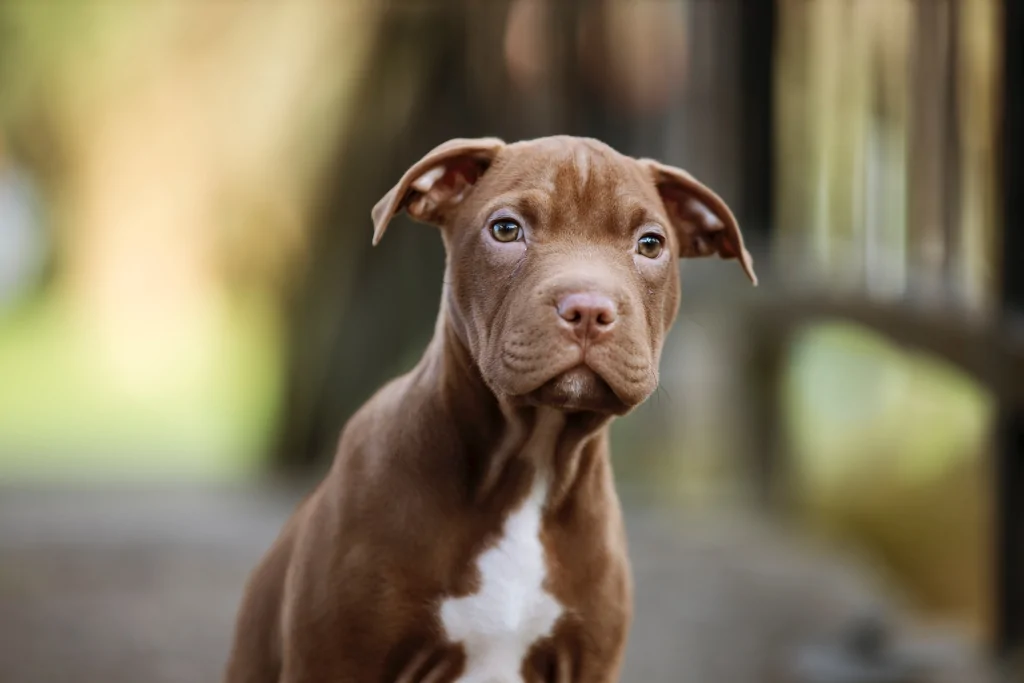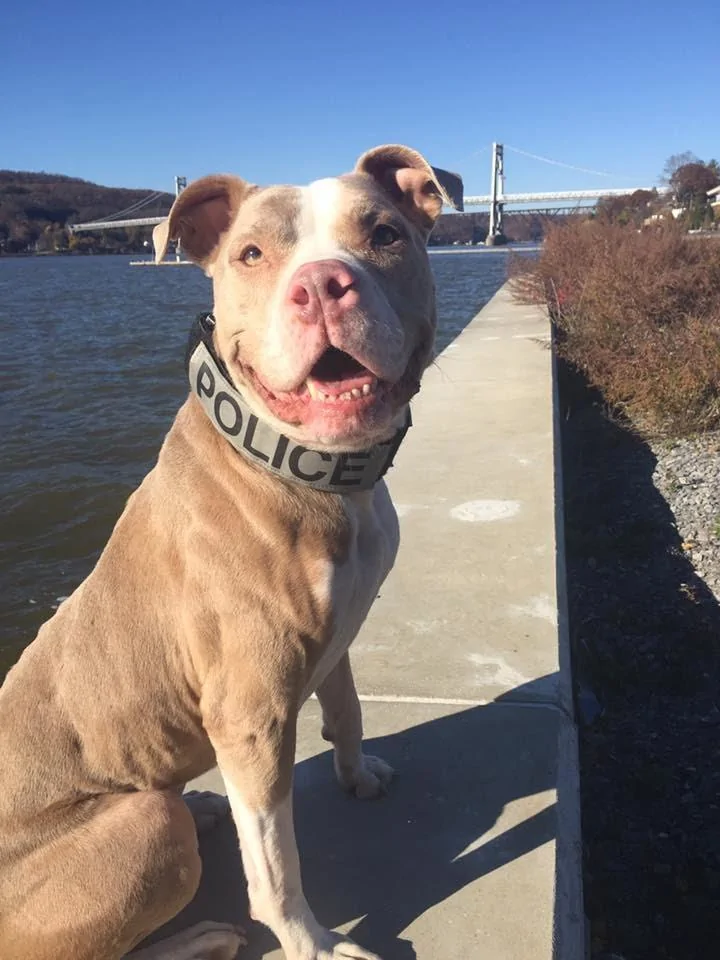Pitbulls, often misunderstood and underestimated, spark curiosity about their potential in law enforcement roles. Many people wonder if these powerful canines can rise to the challenge of police work.
In this blog post, we’ll dive deeper into the world of pit bulls and their capabilities, comparing them to other popular police dog breeds and exploring their unique qualities. Together, we’ll uncover the true potential of these amazing dogs and learn how they contribute to different working roles.
So, let’s get ready to challenge our preconceptions and discover the untapped abilities of pit bulls in the realm of law enforcement.

Why Aren’t Pitbulls Commonly Used as Police Dogs?
While Pit Bulls have the potential to serve as police dogs, they are not commonly used in K9 units for various reasons. Let’s explore some of the key factors contributing to this trend.
Perception and Public Image
Pitbulls have long been associated with negative stereotypes, often portrayed as aggressive and dangerous. This public perception can make it challenging for law enforcement agencies to gain the community’s trust and support when using pitbulls as police dogs.
Breed-Specific Legislation
Some regions have breed-specific legislation (BSL) in place, which restricts or even bans the ownership of certain dog breeds, including pitbulls. In areas with BSL, police departments may avoid using pitbulls in K9 units to comply with local regulations.
Availability of Specialized Training
Many police dog trainers have extensive experience working with traditional police dog breeds, such as German Shepherds and Belgian Malinois.
They may not be as familiar with training pit bulls or may lack the necessary resources to adapt their training methods for these dogs, which could impact their effectiveness in the field.
Preference for Traditional Police Dog Breeds
Law enforcement agencies often have a strong preference for traditional police dog breeds, as they have a proven track record of success in K9 work.
These breeds have been specifically bred and selected over generations for their intelligence, drive, and ability to perform various tasks, making them the go-to choice for most police departments. They are perfect for police work, unlike, for example, Dobermans.
While these factors contribute to the limited use of pitbulls in police work, it’s essential to recognize that each dog is an individual, and breed alone does not determine their ability to excel in K9 roles. By focusing on a dog’s qualities, skills, and temperament, we can better assess their suitability for police work, regardless of their breed.
Can Pitbulls Excel in Police Work?
Yes, pitbulls can excel in police work, provided they have the right temperament, training, and support. Let’s discuss the qualities that make pitbulls suitable for K9 roles and how they can be trained to become effective police dogs.
Strength and Athleticism
Pitbulls are muscular and agile dogs, which allows them to perform physically demanding tasks with ease.
Their strength and athleticism can be an asset in various police work scenarios, such as apprehending suspects or navigating challenging environments.
Drive and Determination
Pitbulls possess a strong work ethic and determination, which are essential qualities for any police dog.
Their drive to please their handlers and complete tasks make them excellent candidates for K9 roles, as they are willing to work hard and stay focused on the job at hand.
Trainability
Pitbulls are intelligent and eager to learn, making them highly trainable. With consistent and positive reinforcement-based training, pitbulls can acquire the necessary skills to perform various police work tasks, such as tracking, searching, or detecting substances.
Socialization and Exposure
To excel in police work, pitbulls must be well-socialized and exposed to a variety of environments, people, and other animals. Early and ongoing socialization ensures that pitbulls remain confident and adaptable, which is crucial for success in K9 roles.

Selecting the Right Pitbull for Police Work
Not all pitbulls may be suitable for police work, just like any other breed. It’s essential to evaluate each dog on an individual basis, taking into account their temperament, health, and overall suitability for the job.
Working with experienced trainers and breeders can help identify the best candidates for K9 work.
In conclusion, pitbulls have the potential to excel in police work, given the right training, socialization, and support. By focusing on the individual dog’s qualities and abilities, pitbulls can overcome the challenges they may face and become valuable members of police K9 units.
Popular Dog Breeds in K9 Units
While pitbulls have the potential to excel in police work, they are not the only breed that can perform well in K9 units. Several other dog breeds are commonly found in K9 units due to their unique qualities and abilities. Some of the popular breeds include:
- German Shepherds. Renowned for their intelligence, loyalty, and versatility, German Shepherds are often the first breed that comes to mind when thinking of police dogs. They excel in various tasks, including tracking, apprehending suspects, and detecting substances.
- Belgian Malinois. Similar to German Shepherds in appearance and abilities, Belgian Malinois are highly energetic, agile, and trainable. They are often used for tasks that require speed and endurance, such as suspect apprehension and search and rescue missions.
- Labrador Retrievers. Known for their friendly nature and incredible sense of smell, Labrador Retrievers are frequently utilized as detection dogs. They excel in sniffing out narcotics, explosives, and other substances, making them valuable assets in K9 units.
- Bloodhounds. With an unrivaled sense of smell and exceptional tracking abilities, Bloodhounds are often used to locate missing persons or track down criminals. Their endurance and determination make them excellent partners in search and rescue operations.
Related: Can Akita Be a Police Dog?
The Unique Qualities of Pitbulls
Pitbulls possess several unique qualities that set them apart from other dog breeds and contribute to their potential success in police work. These traits include:
- Loyalty and Affection. Pitbulls are known for their unwavering loyalty and affection toward their families. This strong bond can translate well into a working relationship with a police handler, as they are eager to please and protect their human partners.
- Resilience and Determination. Pitbulls have a remarkable ability to bounce back from adversity, making them well-suited for the challenges that police work presents. Their determination to succeed and overcome obstacles is an invaluable quality in high-pressure situations.
- Adaptability. Pitbulls are highly adaptable and can thrive in various environments, which is crucial in police work. This adaptability enables them to perform well in diverse situations, from urban settings to remote wilderness areas.
- High Pain Tolerance. Pitbulls have a naturally high pain tolerance, which can be beneficial in police work, as they may encounter physically demanding or uncomfortable situations. This trait helps them remain focused on the task at hand, even in challenging circumstances.
Pitbulls in Other Working Roles
Although pit bulls aren’t commonly used as police dogs, they have found success in various other working roles.
Their strength, intelligence, and loyalty make them well-suited for tasks such as search and rescue, where they excel at locating missing persons or disaster survivors.
Pitbulls also work as therapy and emotional support animals, providing comfort and companionship to those in need.
Additionally, their high energy levels and natural athleticism make them great candidates for dog sports, such as agility and weight-pulling competitions.
In each of these roles, pitbulls demonstrate their versatility and adaptability, showcasing their potential for success in diverse working environments.
FAQs
Are pitbulls as effective as German Shepherds in police work?
Pitbulls can be effective in police work, but their success depends on the specific task and individual dog. While German Shepherds have a long history in K9 units, pitbulls also possess qualities that can make them valuable assets in certain police work situations.
What other breeds are commonly used as police dogs?
Besides German Shepherds and Belgian Malinois, other breeds commonly used as police dogs include Labrador Retrievers, Bloodhounds, Rottweilers, and Boxers. Each breed brings unique qualities and abilities to K9 units.
How are police dogs trained for their work?
Police dogs undergo rigorous training programs tailored to their specific roles, such as tracking, detection, or apprehension. Training often involves obedience, agility, endurance, and specialized tasks, with a strong emphasis on building trust and cooperation between the dog and its handler.
Do police dogs live with their handlers?
Yes, police dogs typically live with their handlers, which helps to strengthen the bond between them and ensures that they are well-cared for and comfortable in their off-duty environment. This close relationship contributes to the success of the dog-handler team in the field.
Alex, a passionate animal lover, has experience in training and understanding animal behavior. As a proud pet parent to two dogs and three cats, he founded AnimalReport.net to share insights from animal experts and expand his knowledge of the animal kingdom.




